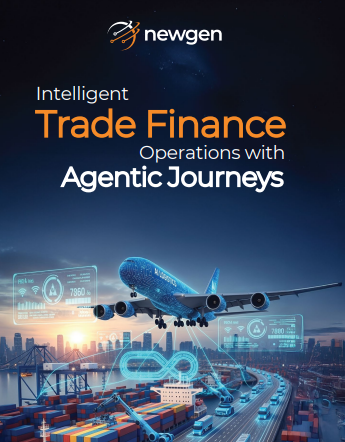Transforming Trade Finance from Paper-Heavy to AI-Driven Precision
For decades, trade finance has been synonymous with complexity — endless paper trails, compliance risks, and time-consuming manual checks. Global banks and financial institutions often found themselves buried under documentation, struggling to meet the pace of global trade while staying compliant with regulations such as UCP 600, OFAC, and FATF.
But the landscape is changing. The next generation of trade finance is AI-first, intelligent, and adaptive — moving from manual scrutiny to Agentic AI-driven automation that delivers both compliance and speed.
This Point of View explores how the integration of AI, Agentic Intelligence, and low-code automation is redefining trade finance operations — enabling institutions to minimize risk, accelerate document handling, and boost ROI.
The High Stakes of Manual Errors
In trade finance, small discrepancies can have massive repercussions.
Manual checks of documents such as Letters of Credit (LCs) or Bills of Lading are error-prone and time-intensive. Even a minor mismatch — say, describing goods as “steel rods” in one document and “steel bars” in another — can delay transactions, violate compliance frameworks, and damage client relationships.
Key risks of manual processes include:
- Regulatory Non-Compliance: Missed sanctions or dual-use goods violations.
- Delayed Payments: Errors in data entry or verification stall trade cycles.
- Disputes and Invalidations: Incorrectly documented transactions result in payment disputes or loss of LC protections.
With global trade growing more interconnected, the need for precision, transparency, and agility in trade finance has never been higher.
The Hidden Complexity of Disjointed Operations
Trade finance is inherently risk-intensive and compliance-critical. However, many banks still manage operations through fragmented systems, where risk, operations, and compliance teams work in silos.
This lack of integration results in:
- Inconsistent Data Quality: Poorly captured information affects monitoring and reporting.
- Limited Workflow Visibility: Teams lack insight into real-time transaction status.
- Compliance Blind Spots: Hidden anomalies or subtle fraud patterns go undetected.
Such inefficiencies increase both operational and reputational risk while slowing trade velocity — especially across cross-border transactions.
Turning Complexity into Clarity with Intelligent Document Processing
In a document-heavy industry like trade finance, Intelligent Document Processing (IDP) powered by AI and NLP has become the foundation for transformation.
AI-driven systems can now automatically capture, classify, and validate trade documents — invoices, bills of lading, and shipping guarantees — regardless of layout or language.
The IDP Advantage
- Faster Processing: Reduce document handling time by up to 65%.
- Improved Accuracy: Achieve 90%+ compliance accuracy, according to Forrester.
- Smarter Compliance: Detect anomalies and ensure adherence to regulatory standards.
With Large Language Models (LLMs) augmenting IDP, banks can now extract contextual insights, verify document authenticity, and ensure full compliance — without the burden of manual review.
Agentic AI: From Automation to Autonomy
Agentic AI marks the next leap in trade finance automation. Unlike traditional RPA or rule-based systems, AI Agents proactively analyze data, detect risks, and take autonomous actions to prevent compliance breaches.
According to Moody’s (2025), banks leveraging AI agents report a 60% increase in document processing efficiency and a drastic reduction in compliance violations.
What Agentic AI Can Do for Trade Finance?
- Autonomously classify documents across complex trade workflows.
- Extract and cross-verify key data fields across invoices, LCs, and shipping documents.
- Detect compliance issues early to prevent violations.
- Ensure consistency with frameworks like UCP 600 and global sanctions lists.
Agentic AI transforms trade finance from reactive to proactive, enabling banks to act before risks escalate — and setting a new benchmark for compliance assurance.
Low-Code Platforms: Democratizing Innovation in Trade Finance
Modernization in trade finance is no longer confined to IT departments. With low-code platforms, business teams can now build, modify, and deploy automation workflows rapidly without extensive coding expertise.
By embedding Agentic AI into a low-code ecosystem, institutions can:
- Rapidly automate document-centric workflows.
- Build new compliance modules on demand.
- Scale solutions across geographies effortlessly.
This combination of AI + Low Code empowers banks to innovate faster while reducing dependency on legacy systems. According to Deloitte, this approach could help the banking sector save 20–40% in software investments by 2028.
From Transactional to Intelligent Trade Finance
The World Trade Organization (WTO) estimates that 80% of global trade relies on trade finance instruments. Managing these efficiently — and securely — is vital for economic stability and customer trust.
A next-generation trade finance ecosystem integrates:
- OCR and NLP: For intelligent data extraction.
- AI and Agentic IDP: For automated validation and compliance.
- Low-Code Frameworks: For seamless integration and scalability.
Together, these technologies enable end-to-end digitization, transforming trade operations from paperwork-heavy to intelligence-led.
The Newgen Advantage: Agentic Trade Finance Transformation
NewgenONE delivers a unified, AI-first digital transformation platform that enables banks to:
- Automate Trade Document Processing: Using AI, NLP, and LLMs for faster turnaround.
- Enhance Risk and Compliance Management: Through real-time analytics and AI agent intervention.
- Empower Innovation: With low-code capabilities to rapidly deploy custom workflows.
- Ensure Transparency: With end-to-end visibility across trade operations.
With Agentic AI at its core, NewgenONE enables global banks to process trade transactions more accurately, reduce compliance exposure, and improve turnaround time — transforming trade finance into a future-ready, intelligent function.
Towards an Intelligent Trade Finance Future
Trade finance no longer needs to be synonymous with slow, paper-based operations. With Agentic AI, low-code innovation, and intelligent automation, banks can achieve:
- Up to 40% cost reduction in document processing.
- 65% faster processing time.
- 90%+ compliance accuracy.
A hybrid approach that combines human expertise with AI-driven intelligence ensures both accuracy and trust — paving the way for a resilient, compliant, and globally competitive trade finance ecosystem.
Transform Your Trade Finance Operations
Discover how to turn compliance complexity into operational clarity with AI and automation.

